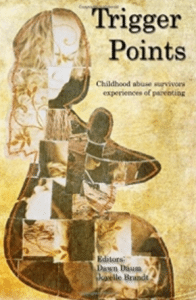Originally published on Wilson Writes on November 18, 2015 By Kelly Wilson.

And TODAY – November 18th – marks the release of a new parenting book determined to start a conversation that will change the lives of millions of Americans. One-third of American children experience childhood abuse, and yet the question is never asked: what happens when those children grow up and have families of their own?
Editors Joyelle Brandt and Dawn Daum are survivors working to break the cycle for their own families. Raising children as an abuse survivor is often a lonely and isolating experience. When Joyelle read Dawn’s article Raising a Girl as a Survivor, she sought Dawn out to ask if they could create a book together. They discovered that they had both gone looking for a parenting book that dealt with these issues, and had not found what they were looking for. So together they started an online community specifically for parent survivors, and started collecting essays to create the Trigger Points Anthology.
The Trigger Points Anthology is a collection of writing by 21 parents who are survivors of childhood abuse. Included in the anthology are two essays written by fathers, a queer woman expecting her first child, mothers from inside and outside of North America, women of different ethnicities, single and married parents. What they have in common is a determination to give their children the safe and happy childhood they wish they’d had.
Here’s an excerpt from my essay, Sorry-in-a-Sack Self:
The next morning, the iPod Touch battery remained empty.
After making this discovery, he came and snuggled with me in my bed, where I had remained from the night before. Aaron sighed. And sighed. And sighed again. “What’s up, buddy?” I asked, setting my book aside.
“I’m tired.” This is his favorite response.
“Oh, really?”
“Well, my iPod Touch doesn’t work.” He buried his head into my shoulder, wiping his tears on my shirt. “It isn’t charging,” he continued, his voice muffled. “Dad says we have to send it back.”
Now, I could have said a lot of things. I could have said “Quit your whining, there are kids in Africa who are starving.” I could have said, “Get over it.” I could have said, “It’s not that big a deal, you should be grateful for what you have.”
I didn’t say any of these things. Because fresh in my mind was the example that Jeff had set the night before. And he hadn’t said any of those things to me. I was faced with an important decision – what did I want to teach Aaron about grief, or emotions, or life?
Take a look at the Trigger Points anthology here, or head over to the Trigger Points website for more info!






